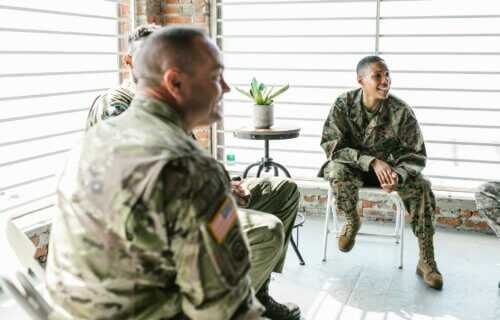BOSTON — Transitioning from military service back to civilian life can be a difficult experience for veterans. Now, researchers from Boston University are the first to focus on how the newest generation of post-9/11 U.S. military veterans are doing after serving their country — and the news is good! Researchers found newer veterans are experiencing similar or better outcomes than non-veterans across a number of different aspects of life.
Study authors adopted a holistic approach, examining the welfare of veterans across a diverse array of considerations, including health, vocational, financial, and social well-being. Notably, modern veterans are engaging in more positive health behaviors and enjoying better outcomes on certain aspects of social well-being in comparison to members of the general public.
“The finding that post-9/11 Veterans reported greater engagement in some health-promoting behaviors is particularly interesting given that this finding contrasts with research on the Veteran population as a whole (including Veterans who served before 9/11),” explains corresponding study author Dawne S. Vogt, PhD, a research scientist in the Women’s Health Sciences Division, National Center for PTSD at VA Boston Healthcare System, in a university release.
Younger veterans engage in more healthier habits
Researchers collected the data for this project in 2018 as part of a confidential online survey focusing on health and broader well-being among both U.S. veterans serving after 9/11 and non-veterans. While researchers did find that post-9/11 veterans (both male and female) dealt with poorer health compared to non-veterans, they also displayed greater engagement in numerous positive health behaviors, including sticking to a healthy diet and exercising more.
Moreover, veterans are more likely to have access to health care. However, the team discovered few differences between veterans and civilians in connection to vocational and financial well-being.
“Despite their greater vulnerability to experiencing health conditions, the newest generation of post-9/11 U.S. Veterans report experiencing similar or better outcomes than non-Veterans in many aspects of their lives. These findings underscore the value of examining a wider range of health and well-being outcomes in Veteran research and highlight a number of important directions for intervention, public health education, policy and research related to the reintegration of military veterans within broader civilian society,” Dr. Vogt explains.
Researchers say it’s understandable that post-9/11 veterans reported poorer health status than their peers considering all of the health risks that come along with military service. All in all, this work supports the need for top-quality veteran health care, support, and community services.
“Given that post-9/11 Veterans reported greater engagement in some health-promoting behaviors than their non-Veteran peers (diet, physical activity, and strength training), these efforts should also focus on preventing declines in veterans’ engagement in health-promoting behaviors as they move through their life course,” Dr. Vogt concludes.
The study is published in the journal Social Science & Medicine.
